The man guiding the spiritual journey of Australia’s biggest Jewish community
As the leader of The Central Synagogue in Bondi Rabbi Levi Wolff has some of the most well known people in Australia in his congregation, but everyone is equal once they step foot into this place of worship.
Sydney Weekend
Don't miss out on the headlines from Sydney Weekend. Followed categories will be added to My News.
He runs the southern hemisphere’s biggest synagogue with some of the country’s wealthiest families filling his seats – but as Rabbi Levi Wolff says, name, title and prestige is stripped away when you step foot in the space where everyone is equal.
From Westfield founder Sir Frank Lowy to billionaire property developer Harry Triguboff, sibling fashion designers Camilla Freeman-Topper and Marc Freeman, even Hollywood stars Sacha Baron Cohen and Isla Fisher when they are in town, The Central Synagogue in Bondi is a place of worship for the biggest Jewish community in Sydney. But the prominence of his congregation is not something Rabbi Wolff emphasises – instead reasoning we are not measured by our means.
“When people enter this space, their titles, their names and level of prominence are not highlighted or emphasised – everybody comes in here as a child of God,” he says.
“Everybody comes in here as important as the other one is, everybody comes in here as a member of the family, and one child is not more important than the other child. And I hope that we can keep it that way.”
The role of the Rabbi is a 24/7 job for the busy father of six. Well 24/6 actually, as every Saturday, the Holy Sabbath is screen free. A whole day of rest – and more importantly, technology free, every single week. And it’s heaven.
“A Rabbi’s phone buzzes 24/6 I should say,” he laughs after being interrupted by phone calls while speaking to Sydney Weekend last week.
“Because on Saturdays, we’re not allowed to have our phones.
“Shabbat, we’re technology free – so even though there’s a lot to do and Friday night, Saturday, is kind of my busiest day of the week, and it just happens to be that you can’t use technology.
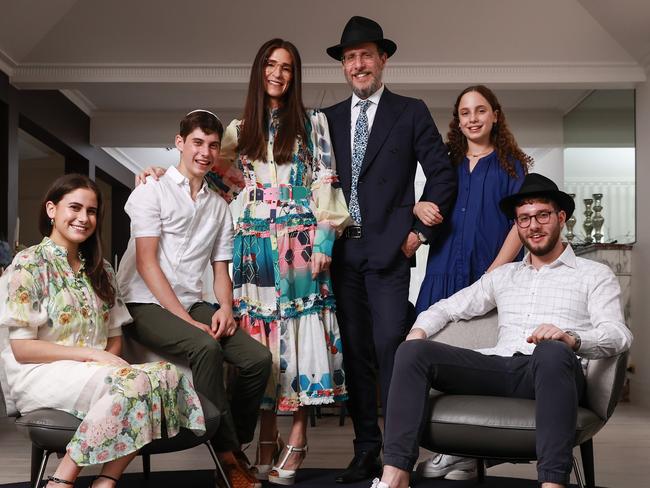
“And by the way, even though these rules were given to us as a Jewish people 3500 years ago, there could be nothing greater today than not being able to go on to your phone for 24 hours.”
Rabbi Wolff tells “an interesting story” he remembers hearing; I soon learn he has many – and all resonate.
“There was a fella by the name of Joe Lieberman who was almost the vice president of the US – he was running with Al Gore … he lost by 500 votes to George Bush and Dick Cheney at the time in Florida,” he continues.
“Anyway, Joe Lieberman happens to be an observant Jew and he also keeps the Sabbath, which means that for 24 hours from sunset on Friday until the stars come out on Saturday, there’s no telephones. So on the campaign trail, one of the members of the media was grilling him and said, ‘Mr Lieberman, I very much respect your religion and all the things that you’ve embraced, but how can somebody be running for the Office of the President of the USA and be able to make big decisions if you’re not available 24/7?’
“And Joe Lieberman looked back at the camera and he said, ‘Can I ask you a question? How can you make big decisions if you are available 24/7’?
“And it’s true.
“How are you expected to think, how are you expected to really be present in big, life decisions, if you’re always on the run?”
His observation rings true to most of us, and truer to many who are on the run 24/7, with no day of rest, no time to reset.
His synagogue seats 2000, and during special holidays like Passover – which this year started on Wednesday and runs through to April 13 – it is busy. It’s a heartwarming reality for the Rabbi, who says he is a man on a mission.
The 49 year old and his wife Chanie, 48, came to Australia in January of 1998, and after a few acts of what he labels “divine providence”, agreed to head east to Sydney to head up The Central Synagogue in Bondi back in August of 2002. Some 22 years later, he has become a steadfast part of life for the city’s biggest Jewish community, guiding them from birth to death and everything in between.
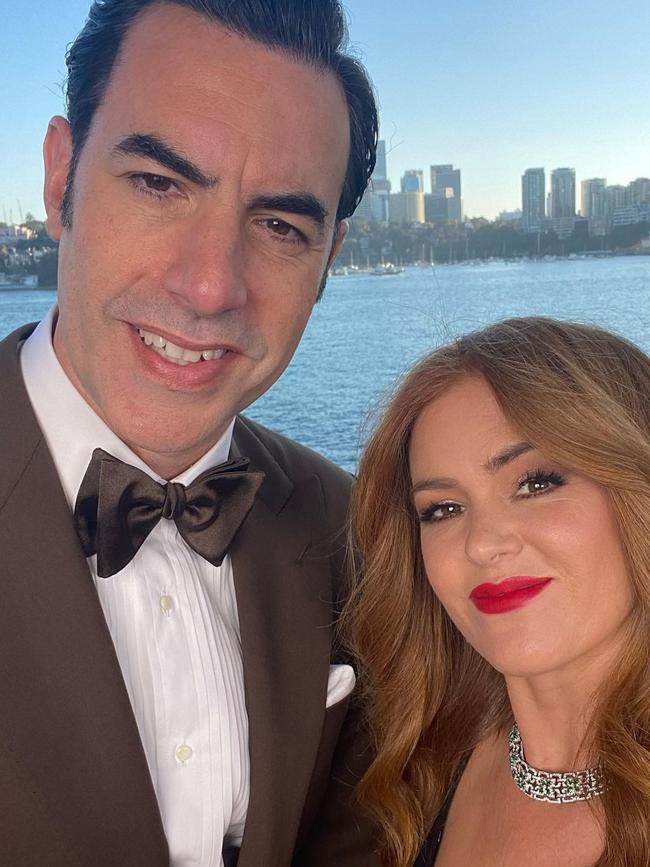
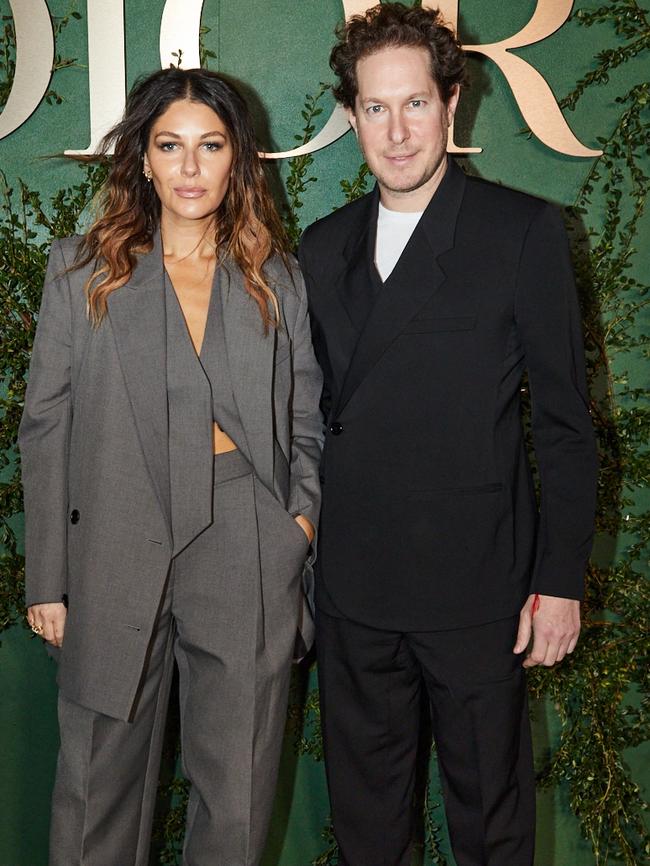
“We actually first moved out of the Jewish community in Perth from New York where my wife and I grew up,” he says.
“My wife and I always grew up knowing that we wanted to go out and make a difference – we knew we wanted to play a part in connecting Jews back to their heritage and bring those people back into the fold. To reach people, and to help them reconnect to their own spiritual path and callings.
“And that’s not necessarily only specifically reserved for the Jewish community, we are very much involved with people beyond just our community, and we try to help people come back to their purpose and really help them appreciate why they’re here.”
He and Chanie are both descendants of Holocaust survivors, and he recalls the time after the war when people did not want to be associated with the Jewish faith.
“Our mission was going to be to go out to a community and try to help and be a voice of purpose and reason,” he says.
“We never really knew much about Australia, we had never really been here … and interestingly, my wife and I belong to an organisation called Chabad – and the spiritual leader of the Chabad movement is Rebbe – it was almost like John F Kennedy created these peace corps, where he sent couples around the world to help lift up the spirits and to help build up communities around the world – the Rebbe did that in a spiritual sense as well.
“The Rebbe came to the Jewish world at a very unique time following the Holocaust, and as one could imagine, the Jews were literally crawling out of Auschwitz – we were totally wiped out.
“My wife’s family, my family, we both come from survivors, so our grandparents left everything behind, everything was stripped away from them and they came out all alone, without any parents, without any siblings.
“And going back to 1951, the Rebbe decided to, little by little, send out Jewish couples around the world to bring back light and warmth and a positive message about being a Jew, because no one wanted to choose themselves after the Holocaust – they wanted to run away, they didn’t want people to know they were Jewish.
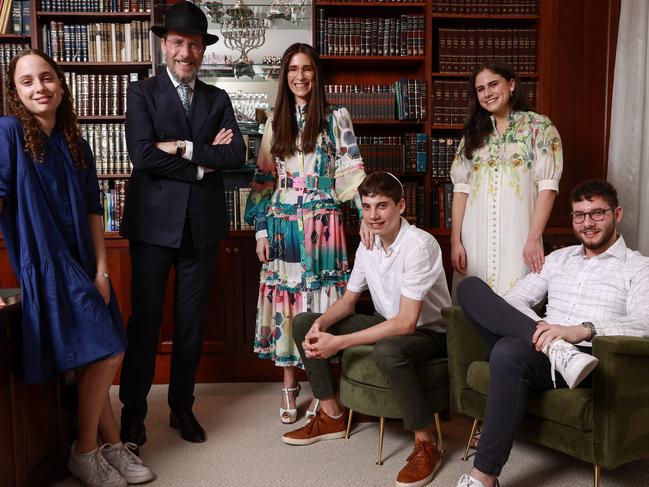
“So we knew that we wanted to be part of that mission to help bring back Jews to Judaism.
“Originally we were asked to take up a post in Perth, and by way of a couple of divine provinces, and a couple of very special coincidences, but I call the divine providence, the community here had recently had their Rabbi leave Central Synagogue, and they approached me and asked me if I would take over this position.
“I was actually quite reluctant for almost a year, because I felt that I was sent to Perth, and this was my place, that was where I should be.
“You know, this not a job or a career – this is a life mission. You can’t do this unless you’re absolutely 100 per cent passionate about it – and it wasn’t going to be about climbing a ladder to the bigger synagogue, I always felt that my mission was there. But eventually I took the advice of mentors and they told me – if a synagogue like that is available, I should go.
“So we began, 22 years ago, Jew by Jew, member by member, and we are trying to make a difference.”
He says, per capita, Australia has the highest number of Holocaust survivors outside of Israel, of any country in the world.
“Primarily because Jews came here because it was the furthest they could get from the ovens in Europe – and number two, Australia was very kind, and was one of the only countries in the world that opened up its doors after the war for Jewish survivors,” he says.
“And those survivors, by the way, are many people who today have made one of the greatest contributions financially to this country, and many of them belong to our synagogue. And these are people who came here with literally not even a shirt on their back.”
The current festival of Passover is arguably one of the most widely observed of all Jewish holidays – and as Rabbi says, for good reason.
“The essential message of Passover is one of freedom, and the will to preserve, with faith, against all odds,” he says.
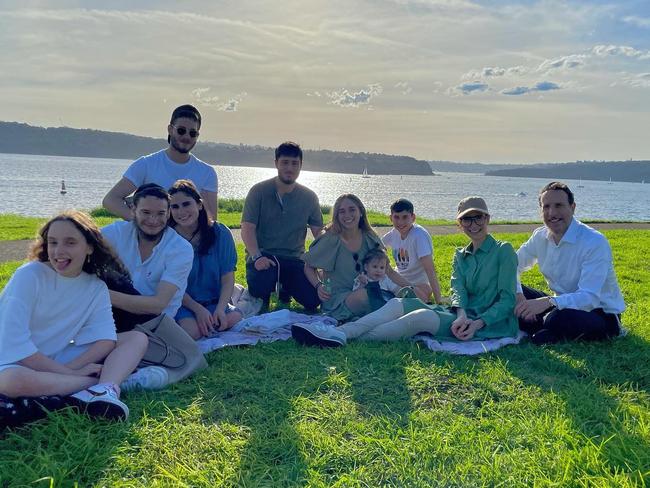
“Because when Moses comes to Pharaoh, and he cries out those very famous words, ‘Let my people go’ – Moses was speaking on behalf of all the oppressed of the world – both then and now.
“And that call ‘Let my people go’ remains true today, as it was then.
“And as we celebrate Jewish freedom, Passover, on the eve of the fifth of April – we will celebrate Jewish freedom, but heavily weighing on our hearts will be the prayer for renewed freedom for people around the globe.
“People in Ukraine and other places that are oppressed and don’t have the opportunities to live as freely as we do.
“And the truth is, the whole idea of freedom has a very personal message, because today we are enslaved.
“People are enslaved to technology and enslaved to telephones – we live in an age where people have addictions, all kinds of addictions – harmful substances, sometimes people are enslaved to a poisonous relationship, they have toxic habits, they have sometimes negative ideologies.
“And Passover is a detox retreat.
“It’s where the spirit of liberty calls upon us to free ourselves from things that are weighing you down … and Passover reminds us that the first step towards freedom is sometimes to go cold turkey.
“No hesitations.
“You’re going to make a sudden, complete exodus from the you that was, and you have to learn how to march through – sometimes the desert as the Jews did – towards the ‘you’ that can be.
“And it’s an unbelievable opportunity today, where we are sometimes a slave to no one else, but ourselves.
“We live in a country, a society, where no one’s standing over us – but sometimes we are enslaved to ourselves.
“We’re enslaved to scrolling down the screen, we’re enslaved to getting likes, we’re enslaved to what people think about us – we’re enslaved to so much – and we are not allowing ourselves to be the true me and the true you.
“And Passover reminds us that you’ve got to be free.”
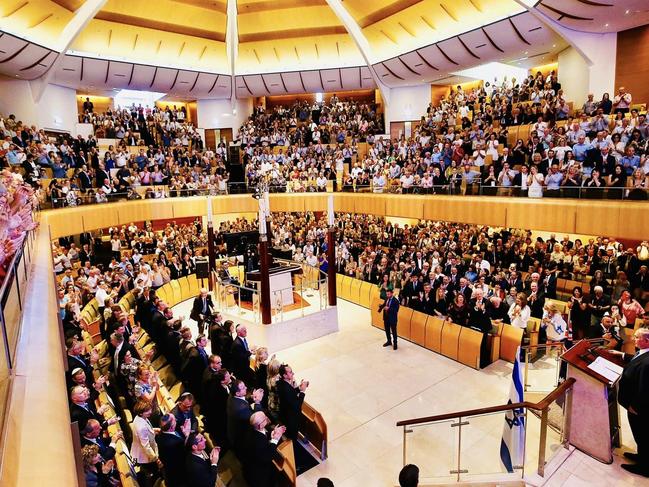
Rabbi Wolff and his wife have six children, aged from 25 to 12 – but if you ask him, he has nine children, lovingly including his son-in-law and two grandchildren – and ever the family affair, many are involved with the synagogue.
So how does he draw a crowd, week after week? Well that’s easy. Connection comes from relevance – an important factor some may argue is missing from Judaism’s religious counterparts.
“Judaism, the way we were taught, and the way we try to teach it – the messages of the Torah, the messages of the Bible – are as relevant today, as they were yesterday,” Rabbi Wolff says.
“In fact, the more you study and the more you engage, the more you see how it’s talking to you.
“The Word of God is not something that He spoke to Moses and then He went to snooze somewhere and He hasn’t come around – the word of God speaks to every single human being, wherever she or he is, at every age. Because God continues to watch over us and guide us, and give us the assistance and sustenance that we need.
“And this could be another reason why sometimes people feel that affinity and a connection to returning and coming back to the synagogue – we try and take all those messages that we read weekly in the Torah, and we try to apply it to a young man and woman, or an elderly man and woman – in 2023.
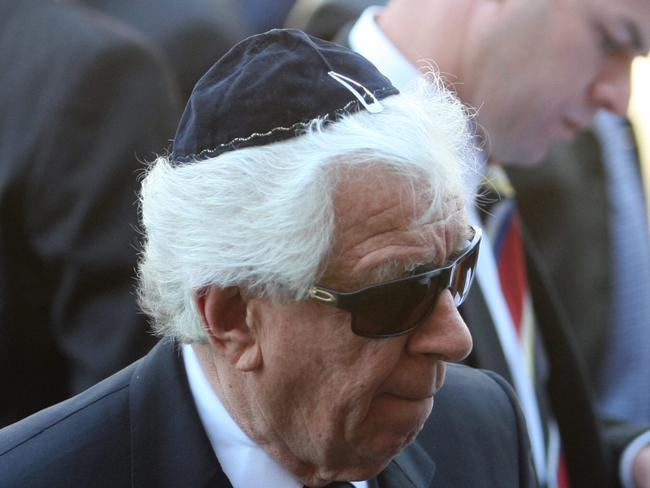
“If the Torah doesn’t speak to us, in April of 2023, we are not reading the Torah correctly.
“It cannot be something of the past, it has to be something that’s absolutely relevant to you today – and that’s the only way that Judaism becomes relevant.
“Otherwise it becomes my father’s or grandfather’s or grandmother’s traditions and it’s something that I can’t relate to.
“People want to be able to understand – how is this talking to me? How is this going to change my life? How is this relevant to me? And unless we do that, we get stuck somewhere else – we have to be able to take amazing stories of the past and understand how these things talk to us today.”
When speaking to Sydney Weekend, the Rabbi is drained from an emotional day earlier, helping a grieving community come to terms with the death of a young father. When it’s tough, it’s tough. But when you break through – when you connect – he shares messages he says we need now more than ever before. And that’s what keeps people coming back.
“I think there is a thirst for something more today,” he says.
“We’re a privileged generation – we have everything, and more than anyone ever could imagine.
“And many people are in positions where they have so much that they don’t even know what to do with it – and I don’t necessarily only mean as far as financial means.
“I mean the freedoms and the accessibility and the choices that we have today.
“And what happens is, there comes a time when you have so much that it’s not going to quench – and there’s a deep desire for meaning and purpose.
“When you can quench that thirst, when you can give somebody who has an abundance of everything, but is still missing something and feels that there’s something substantial that’s not answering the call of purpose – and you give them spirituality, you give them a real feeling of being able to contribute.
“And what happens is, there comes a time when you have so much that it’s not going to quench – and there’s a deep desire for meaning and purpose.
“When you can quench that thirst, when you can give somebody who has an abundance of everything, but is still missing something and feels that there’s something substantial that’s not answering the call of purpose – and you give them spirituality, you give them a real feeling of being able to contribute.
“You give them the feeling to be there beyond oneself and to be there for a higher purpose – for our fellow man and for our community … to bring goodness and kindness.
“I think that helps people really find a true calling and meaning in life.
“But it also puts all the rest of the blessings that she or he has into a much greater perspective.
“So in Judaism, we don’t reserve a purpose and meaning for only specific days of the year, there’s daily rituals that we remind ourselves – we have Jewish holidays which are peppered throughout the calendar, but then you have every single Friday and every single Saturday, where you’re being anchored again.
“And then every day, throughout the day, we pray.
“We take a few minutes to close our eyes and think about things like – why am I here? What has gone wrong for me? Why did you bring me here? There’s got to be more than just earning a living and going on holiday, it’s got to be a lot more to that.
“And I think when we can break that down and unpack it and give people some substantial meaning and purpose – and they come back for more, because when something’s real, you taste it and you love it.”





